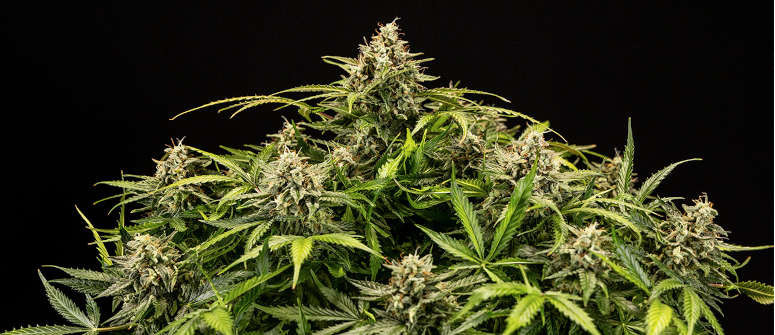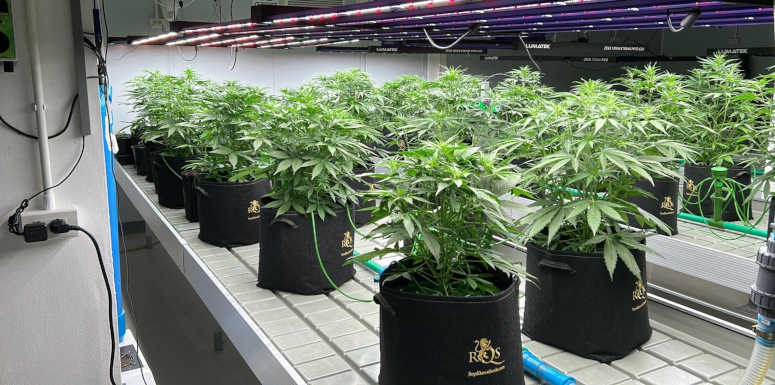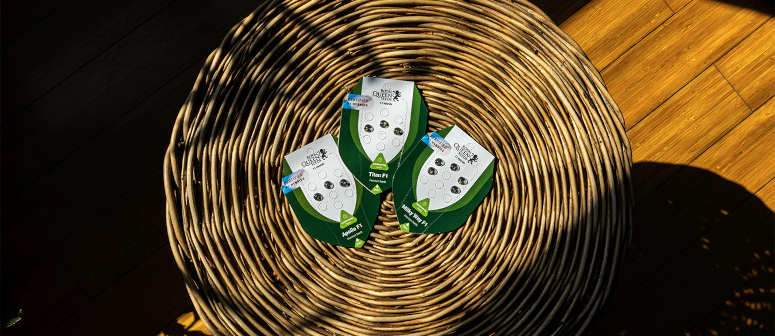1 year ago, F1 hybrids by Royal Queen Seeds shook the world of cannabis genetics

F1 hybrid cannabis seeds have now been on the market for a year. Here's how they have changed things, and our favourite strains to try.
Contents:
Ask any cannabis grower to comment on the reliability of weed strains, and they'll likely let out a sigh. In the world of cannabis cultivation, uncertainty is the only real certainty when it comes to genetics and plant performance. Due to the murky legal status of weed, the genetic origins of even the most popular cultivars are often shrouded in mystery, and the plants growers have had access to are far from reliable. Even when growing the same strain from the same breeder, it's commonplace to find major differences from one phenotype to another. These can range from morphological traits like height and stature to differences in the aromas, flavours, and effects produced by the buds you harvest.
Unlike other agricultural and ornamental plants, cannabis is far from a stable crop. Or at least, that's what we thought. Last year, the cannabis industry was shaken by the arrival of F1 hybrid cannabis genetics, which promised not only superior yields and potency but also a reliable, vigorous crop with the stability we see in other agricultural cultivars. Royal Queen Seeds, one of international’s leading cannabis seedbanks, was the first to tap into the world of F1 Hybrid genetics and make them available to home growers and commercial cannabis cultivators alike.
How F1 hybrids changed the game of cannabis cultivation

With the launch of F1 hybrids in 2023, cannabis growers caught a glimpse of what the future of cannabis cultivation might look like. With the expert breeding and crossing of well-established, stable inbred genetic lines, F1 hybrids offered growers heavier harvests of more aromatic, flavourful, and potent flowers. Most notably, however, F1 hybrids feature exceptional stability, a word that carries a lot of weight in an industry that has long dealt with unreliable and inconistent genetics. Unlike conventional strains, which are known to produce phenotypes that can look and grow very differently, F1 hybrids are reliable plants with uniform morphological traits and flowering times, and produce a reliable end product—harvest after harvest. But it doesn't end there.
With the added reliability of F1 genetics, cannabis growers have been able to streamline their operations. Growing plants with a uniform height and structure, as well as a uniform flowering time, gives growers the freedom to automate their processes and grow rooms, rather than having to take the time to attend to the needs of individual phenotypes. Most importantly, growers running commercial operations in legal markets now enjoy the added benefit of harvesting a reliable final product that meets the expectations of not only the grower, but also retailers and, finally, consumers.
For the medical marijuana market, F1 hybrids offer dispensaries and growers access to plants with stable production of cannabinoids and terpenes—an important step forward for an industry that relies on plants that can produce a reliable product. The impact of F1 hybrids has been so positive that Royal Queen Seeds named Orion F1, a fast and high-yielding descendant of the Blue and Amnesia genetic families, its strain of the year in 2023.
What are F1 hybrids, and what makes them so great?
So, F1 hybrids have clearly made a lasting impact on the world of cannabis genetics. But why? What is it that gives F1 hybrids their edge over conventional cannabis strains?
Cannabis strains are bred from what breeders often refer to as "non-fixed" parents. These are cannabis varieties created by crossing two plants (often landraces) with a lot of genetic variety. These crosses give rise to heterogeneous offspring that can vary greatly because they come from a very diverse gene pool and have inherited a wide range of genetic information from their forebears. To understand this, it helps to think of yourself and your siblings—you all have the same parents but likely look very different, as you express the genetic information you've inherited in different ways (monozygotic twins, of course, are an exception here).
F1 hybrids, on the other hand, stem from what breeders call inbred genetic lines, or simply inbred lines (IBLs). The creation of these genetic families takes several years and involves the careful crossing of parent strains and inbreeding over several generations. With each generational cross, breeders take the time to sift through the resulting offspring and select plants with the exact genetic traits they are looking to preserve. This may include:
- A particular stature (short vs tall; bushy vs stretchy)
- A shortened flowering time
- Particular aromas and flavours
- Resistance to a particular stressor (such as pests or specific environmental conditions)
Once they've found the plants with the genetics they are looking for, cannabis breeders inbreed the plants. Then, they sift through the offspring again, looking for the plants that best preserve the genetic traits they are interested in. This process is repeated over several generations, purging out the genetic information that breeders want to discard, minimising the possibility of genetic variation. Of course, this process takes its toll and gives rise to plants with reduced vigour and yields. However, when breeders take two IBLs and cross them, something seemingly magical happens.
In the resulting F1 hybrids (F1 stands for filial 1, denoting the first generation of a genetic cross), heterosis occurs—a phenomenon that reverts inbreeding depression and gives rise to plants with the desired traits of both parents, as well as an astounding increase in health, yield, and disease resistance (known as hybrid vigour).
Moreover, F1 hybrids boast high uniformity, making for plants that are extremely valuable to commercial operations due to their ability to simplify the growing process, produce a reliable end product, and offer a viable alternative to the old industry standard of cloning (which long served as the only surefire way for cannabis growers to preserve a particular plant). With its new launch of F1 hybrids in 2023, Royal Queen Seeds made these exceptional plants available to home growers everywhere.
The best F1 hybrid strains

F1 hybrids truly have something new and exciting to offer. If you're interested in growing these industry-changing specimens in your garden or tent, check out some of the following F1 hybrids from Royal Queen Seeds.
Orion F1 – Best strain of the Year by Royal Queen Seeds
As one of the first-ever F1 cannabis hybrids to hit the market, Orion F1 impresses with its vigour, uniformity, and high yields. Descending from multiple Blue and Amnesia genetic lines, this hybrid is potent, super aromatic, and fast—Orion F1 plants can be harvest-ready just 10 weeks after germination. The plants develop a thick canopy of bright green leaves, a mammoth central stem, and multiple thick side branches. Like all RQS F1 hybrids, Orion F1 is autoflowering and quickly grows heavy with long, thick colas. Come harvest time, it rewards growers with excellent harvests of tight, bright green buds with a crystalline coat of resin. Its aroma combines a candy sweetness with notes of ripe fruit and refreshing hints of pine, while its mix of cannabinoids provides a warm body stone and an uplifted mental state.
Titan F1 – True F1 Hybrid power
Titan F1 gets its name from its colossal strength. Like Orion F1, Titan F1 descends from inbred genetic lines including Blue Dream and Amnesia, two strain families renowned for their potency and excellent growth traits. As a result, this strain is easy to grow, thanks to its compact structure and speed; Titan F1 goes from germination to harvest in just 40–45 days. She produces a dense canopy of thin leaves, yet has a high bud:leaf ratio, making for easy trimming. Titan F1 boasts a tantalising aroma that combines notes of candy and ripe fruit with the tang of sweet lemongrass, making her a pleasure for the senses. Meanwhile, her high THC levels (the highest of all of RQS' F1 hybrids) deliver a relaxing stone that melts over the entire body while relieving mental tension—the perfect way to round out a productive day.




